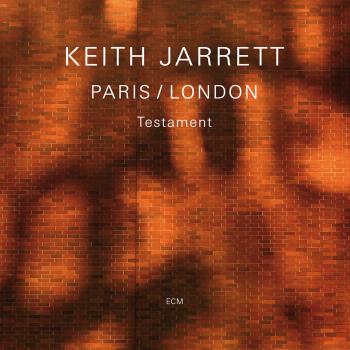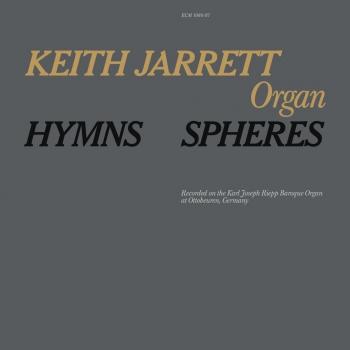
Hamburg ‘72 (Live at NDR Funkhaus, Hamburg) Keith Jarrett
Album info
Album-Release:
2014
HRA-Release:
20.11.2014
Album including Album cover Booklet (PDF)
I`m sorry!
Dear HIGHRESAUDIO Visitor,
due to territorial constraints and also different releases dates in each country you currently can`t purchase this album. We are updating our release dates twice a week. So, please feel free to check from time-to-time, if the album is available for your country.
We suggest, that you bookmark the album and use our Short List function.
Thank you for your understanding and patience.
Yours sincerely, HIGHRESAUDIO
- 1 Rainbow (Live) 09:52
- 2 Everything That Lives Laments (Live) 09:44
- 3 Piece for Ornette (Live) 09:33
- 4 Take Me Back (Live) 08:08
- 5 Life, Dance (Live) 03:00
- 6 Song for Che (Live) 15:08
Info for Hamburg ‘72 (Live at NDR Funkhaus, Hamburg)
The legendary Keith Jarrett Trio, playing live at NDR Funkhaus, Hamburg in July 1972, is captured at the very apex of its creativity on an album released for the first time by ECM. From the first notes, with its radiant piano, it is clear that something special is happening here.
The trio with Charlie Haden and Paul Motian – formed in 1966 – was Jarrett’s first great band, his choice of players a masterstroke. With the bassist who had learned his craft in Ornette Coleman’s band, and the drummer from Bill Evans’s ground-breaking trio, Jarrett was able to explore the full scope of modern jazz, from poetic balladry to hard-swinging time-playing to ferocious and fiery free music.
The improvisation heard in the Hamburg concert includes episodes with Keith on soprano sax and flute as well as piano, while Motian expands the role of percussion in the music, developing the supple, elastic, supremely unpredictable vocabulary that would subsequently become such a crucial part of both Jarrett’s groups and Paul’s own. The interaction between the three musicians is uncanny throughout, reaching a peak in an emotion-drenched performance of Charlie Haden’s “Song for Che” (this is Jarrett’s only recording of a piece that has become a new jazz classic).
Keith Jarrett, piano, soprano saxophone, flute, percussion
Charlie Haden, double bass
Paul Motian, drums, percussion
Remixed and remaster by Manfred Eicher and Jan Erik Kongshaug from the original tapes
Recording background:
The Keith Jarrett Trio, playing live at NDR Funkhaus, Hamburg in July 1972. The trio with Haden and Motian was Jarrett’s first great band, his choice of players a masterstroke. Charlie and Paul hadn’t worked together until Jarrett brought them into each other’s orbit in 1966. With the bassist who had learned his craft in Ornette Coleman’s band, and the drummer from Bill Evans’s ground-breaking trio, Jarrett was able to explore the broadest scope of modern jazz, from poetic balladry to hard-swinging time-playing to ferocious and fiery free music. The improvisation heard in the Hamburg concert includes episodes with Keith on soprano sax and flute as well as piano, while Motian expands the role of percussion in the music, developing the supple, elastic, supremely unpredictable vocabulary that would subsequently become such a crucial part of both Jarrett’s groups and Paul’s own. The interaction between the three musicians is uncanny throughout, reaching a peak in an emotion-drenched performance of Charlie Haden’s “Song for Che” (this is Jarrett’s only recording of a piece that has become a new jazz classic). But from the first notes of “Rainbow”, with its radiant piano, it is clear that something special is happening here.
The German radio concert from which this album is drawn was part of a tour – the first European tour for this trio – organised by ECM. Manfred Eicher returned to the original analog sources 42 years later, remixing the music recorded by NDR engineer Hans-Heinrich Breitkreuz for this edition in Oslo in July 2014, together with Jan Erik Kongshaug. (As it happened, the work took place the day after Charlie Haden’s death.)
Haden’s importance in this music can hardly be overstated. He is such a strong, centering presence. Jarrett plus Haden was always a special combination, of course, as recordings from Arbour Zena to Last Dance have eloquently shown, but for dynamic interplay between pianist and bassist the Hamburg recording is hard to beat. Charlie highly valued this musical association, and the way in which Jarrett would compose tunes for the strengths of the trio members: “I think some of the greatest music made in that time period came out of that group,” Charlie told Ethan Iverson a few years ago. “Keith was always his own person, with original ideas as a leader. He wrote specifically for us. I loved it. He showed up at every rehearsal and sound-check with new music. It’s amazing when you go over a new tune at a sound-check and can’t wait to play it that night, since it already felt like ‘you’.”
The Hamburg concert dates from the beginning of ECM’s association with Keith Jarrett, whose solo album Facing You had been recorded the previous November and released just three months before this show.
In the US, Keith Jarrett had begun to include saxophonist Dewey Redman in his group music and the trio was in the process of morphing into the group colloquially known as Jarrett’s American Quartet. Several of the Jarrett tunes heard here, amongst them “Everything That Lives Laments” and “Piece for Ornette”, would also find expression in the quartet repertoire. Much inspired quartet music was ahead, including the landmark albums The Survivors’ Suite and Eyes of the Heart. But Hamburg ’72 captures the core trio of Keith Jarrett, Charlie Haden and Paul Motian at the very apex of its creativity.
The trio’s earlier albums were Life Between The Exit Signs (recorded 1967), Somewhere Before (1968) and The Mourning of a Star (1971).
Keith Jarrett
At the end of 2008, Keith Jarrett added two concerts to his schedule at short notice – one at Paris’s Salle Pleyel (November 26), one at London’s Royal Festival Hall (December 1) . The music on “Testament” is from these concerts. Their range is compendious, Jarrett’s improvisational imagination continually uncovering new forms, in a music stirred by powerful emotions. In his liner notes, the pianist is forthright about the personal circumstances promoting a need to lose himself in the work once more.
He also reminds the reader/listener that “it is not natural to sit at a piano, bring no material, clear your mind completely of musical ideas and play something that is of lasting value and brand new.” This, however, has been the history and substance of the solo concerts since Jarrett initiated them, almost forty years ago . Over time their connection to ‘jazz’ has often become tenuous, yet Jarrett’s solo concerts, with the foregrounding of melody and the continual building, and relinquishing, of structure, are also removed from “free improvisation” as a genre. Jarrett’s solo work is effectively its own idiom, and has been subject to periodic revisions by the pianist. “In the early part of this decade, I tried to bring the format back: starting from nothing and building a universe.”
Since the “Radiance” album and the “Tokyo Solo” DVD of 2002 Jarrett has been adjusting the flow of the work, more often working with shorter blocks of material. “I continued to find a wealth of music inside this open format, stopping whenever the music told me to.” This approach distinguished “The Carnegie Hall Concert” (2006), and it is most effectively deployed in “Testament” , where the strongly-contrasting elements of the sections of the Paris concert in particular have the logic of a spontaneously-composed suite. The nerves-bared London performance (the first UK solo show in 18 years) is different again: “The concert went on and, though the beginning was a dark, searching, multi-tonal melodic triumph, by the end it somehow became a throbbing, never-to-be-repeated pulsing rock band of a concert (unless it was a church service, in which case, Hallelujah!).”
In the end, the improviser does what must be done. As Keith Jarrett said, a long time ago, “If you’re a rock climber, once you’re halfway up the face of the cliff, you have to keep moving, you have to keep going somewhere. And that’s what I do, I find a way.”
These days, however, Jarrett is rationing the number of ascents: there have been less than thirty solo concerts in the last decade, making “Testament” a special event indeed. Two further solo performances are scheduled for 2009 – at the Palais des Beaux Arts in Brussels on October 9, and at Berlin’s Philharmonie on October 12.
Booklet for Hamburg ‘72 (Live at NDR Funkhaus, Hamburg)

























